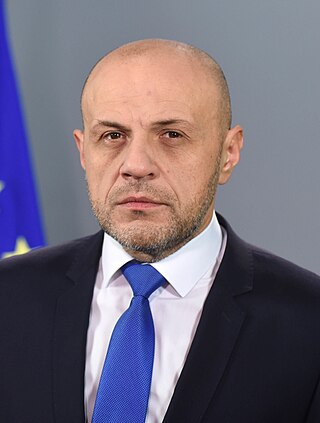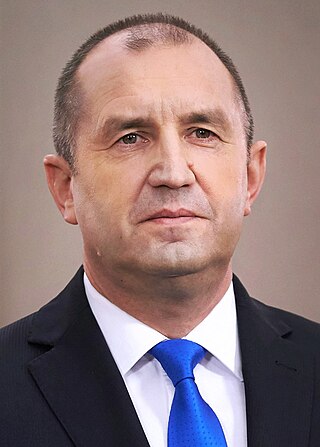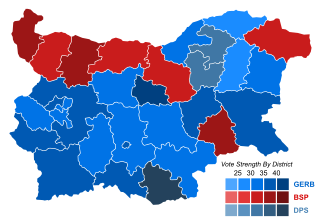
The politics of Bulgaria take place in a framework of a parliamentary representative democratic republic, whereby the prime minister is the head of government, and of a multi-party system. Executive power is exercised by the government. Legislative power is vested in both the government and the National Assembly. The Judiciary is independent of the executive and the legislature.

European Parliament elections were held in Bulgaria on 20 May 2007. It was the country's first European election, having joined the Union on 1 January of that year. The country still had 18 MEPs, no change from before the election. Until Bulgaria could hold these elections, the country was represented by MEPs appointed by the National Assembly.

The eighty-ninth cabinet of Bulgaria, also known as the Three-party coalition cabinet and the Stanishev Government, ruled from August 17, 2005, to July 27, 2009. The cabinet was formed with the coalition of the three leading at that time: BSP, NDSV and DPS, in order of their parliamentary representation. Their parliamentary representation also determined the number of cabinet appointments.

Tsvetan Genchev Tsvetanov is a Bulgarian politician and former government official. He served as the chairman of the GERB party until 2009. On 8 July 2009, following his party's victory in the 2009 parliamentary election, he was designated by de facto party leader Boyko Borisov as the future Minister of the Interior.

Rosen Asenov Plevneliev is a Bulgarian politician who served as the 4th President of Bulgaria from 2012 to 2017. Affiliated with the GERB party, he previously served as Minister of Regional Development and Public Works from 2009 to 2011.

Presidential elections were held in Bulgaria on 23 October 2011, with a runoff held on 30 October 2011. Incumbent president Georgi Parvanov was not eligible for re-election; the Constitution of Bulgaria limits a president to two terms. No candidate won outright in the first round, resulting in a runoff between the eventual winner, Rosen Plevneliev of GERB, and Ivaylo Kalfin of the Bulgarian Socialist Party.

A referendum on building a new nuclear power plant was held in Bulgaria on 27 January 2013. Whilst it was not explicitly mentioned in the question, it was widely acknowledged that the referendum was about restarting construction at the Belene Nuclear Power Plant.

Parliamentary elections were held in Bulgaria on 12 May 2013, two months ahead of schedule. Protests had forced the resignation of the GERB government in February, leading to the election being moved up.

An election of the Members of the European Parliament from Bulgaria to the European Parliament was held on 25 May 2014 as part of the larger European Parliament election. After a decision by the European Council in 2013, Bulgaria was allocated 17 seats in the European Parliament for the Eighth European Parliament.

Mihail Raykov Mikov is a Bulgarian politician who was Chairman of the Bulgarian Socialist Party (BSP) from 2014 to 2016. He is a parliamentarian with six consecutive terms as a deputy in the National Assembly. His career in the legislature culminated in his election as Chairman of the 42nd National Assembly on May 21, 2013. Mikov was Minister of Interior from 24 April 2008 to 29 July 2009 in Sergei Stanishev's government. Currently he is the leader of the Parliamentary Group of BSP Left Bulgaria in the 43rd National Assembly, the coalition led by the socialist party. Mihail Mikov was elected as Chairman of the BSP on 27 July 2014, succeeding Sergei Stanishev. He won a run-off against outgoing Economy and Energy Minister Dragomir Stoynev with a final tally of 377-333.
The Oresharski Government was the ninety-second cabinet of Bulgaria which took office on 29 May 2013. The government, led by Prime Minister Plamen Oresharski, is one of technocrats created following the 2013 election. The cabinet was dissolved on 6 August 2014 to make way for a caretaker government that would lead Bulgaria through early elections in October of the same year.

Parliamentary elections were held in Bulgaria on 5 October 2014 to elect the 43rd National Assembly. GERB remained the largest party, winning 84 of the 240 seats with around a third of the vote. A total of eight parties won seats, the first time since the beginning of democratic elections in 1990 that more than seven parties entered parliament. Boyko Borisov then became prime minister as head of a coalition with the Reformist Bloc and with outside support from the Patriotic Front and the Alternative for Bulgarian Revival.

Reload Bulgaria is a populist political party in Bulgaria.

The ninety-fourth Cabinet of Bulgaria took office on November 7, 2014. It was a coalition government chaired by Boyko Borisov. The government was formed after Borisov's party, GERB, won the 2014 parliamentary election. As GERB won 84 out of the 240 seats in the National Assembly, they were compelled to form a coalition to legally govern.

Presidential elections were held in Bulgaria on 6 November 2016, alongside a referendum on changes to the electoral system and political party funding. The second round was held on 13 November 2016, resulting in the victory of Rumen Radev.

Parliamentary elections were held in Bulgaria on 26 March 2017. They had originally been scheduled for 2018 at the end of the four-year term of the National Assembly. However, following the resignation of Prime Minister Boyko Borisov and the failure of Bulgarian parties to form a government, early elections were called. Borisov resigned following the defeat of Tsetska Tsacheva, the candidate of his GERB party, in the November 2016 presidential elections. The official election campaign began on 24 February.
Yes, Bulgaria!, is a Bulgarian political party, founded in January 2017 by former Minister of Justice Hristo Ivanov. Yes, Bulgaria! is part of an electoral alliance with the Democrats for a Strong Bulgaria called Democratic Bulgaria.

Tsveta Valcheva Karayancheva is a Bulgarian engineer and politician who served as Speaker of the National Assembly from 2017 to 2021. A member of the GERB party, she also served as Member of the National Assembly from 2009 to 2021, before returning in 2024.
We Continue the Change, sometimes translated as Change Continues, is a centrist, anti-corruption political party and formerly an electoral alliance in Bulgaria led by Kiril Petkov and Asen Vasilev, two former caretaker ministers. It was founded ahead of the November 2021 election. The party was officially registered on 15 April.

Snap parliamentary elections were held in Bulgaria on 27 October 2024, after all three attempts to form a government following the latest June 2024 elections failed. This was the country's sixth snap election since 2021. This series of snap elections is the result of a political crisis affecting the country.


















